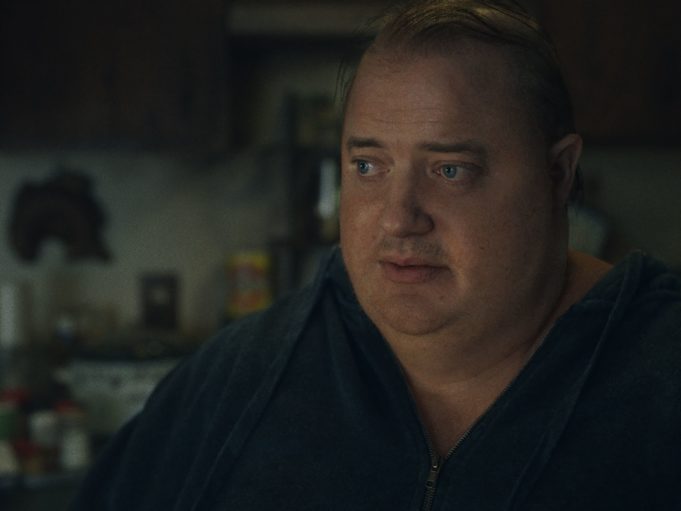Watching The Whale is a torturous experience. So are the best Darren Aronofsky movies. Going all the way back to his debut film π, he regularly subjects his characters to torments physical, mental, and emotional. Some people think that this diminishes him as a filmmaker. I would point out that you could say the same about Hitchcock and Polanski. This may have made them human beings to avoid, but it helped make them great directors. (Actually, it was that other thing about Polanski that made him someone to avoid.)
Much of the debate around The Whale is about whether this movie’s depiction of a 600-pound protagonist is just so much fatsploitation. I say: You’d better believe it is. The first time Charlie (Brendan Fraser) lifts himself up from his sofa, it’s shot like something out of a horror movie, with the character’s bulk towering over the other people in his room and Rob Simonsen’s string score heaving away in awe and terror. Aronofsky uses a squarish frame to emphasize Charlie’s fatness. Surely there’s value in showing us the struggles that a person of this size would experience in everyday life, but this movie crosses well over into the realm of holding up this person’s overweightness and obsession with food to provoke disgust and lurid fascination. Charlie’s blood pressure reading is 234/168, a number that he punches into Google, which tells him to call 911 immediately. Instead, he reaches for another 3 Musketeers bar.
I’m trying to come to grips with the critical pans that this movie has received and the great praise that greeted the Samuel D. Hunter play that this is based on when it debuted on Broadway 10 years ago. Every actor who has played the lead role on the stage has worn a prosthetic fat suit like Fraser does, even when those actors happened to be fat people themselves (like Shuler Hensley, who originated the role), because no theatrical or film production will take the fiduciary risk on a 600-pound actor. It’s important to note that Charlie’s obesity is not genetic — he has made the conscious decision to eat himself to death in the years since his gay partner committed suicide. He’s like the heroin addicts in Aronofsky’s Requiem for a Dream, only I’m not sure that the conceit works here. Compulsive eaters generally don’t have death in mind as an endpoint to their compulsion, and people who want to kill themselves generally don’t choose such a laborious way out.
For all this, I found myself sucked in as the movie examines Charlie’s life confined to an apartment in some corner of rural Idaho where it rains all the time, from whence he teaches online college writing courses and lies to his students that the camera on his laptop is broken, so he doesn’t have to show them his face. His life is upended when his daughter Ellie (Sadie Sink), whom he abandoned at age 8, sees him for the first time in eight years and announces that she’s failing high school. He seizes the opportunity to help with her English essays. The title The Whale doesn’t refer directly to Charlie but to an essay about Moby-Dick that he reads whenever his chest pains make him feel like he’s dying, which is often.
I read over the various reviews of the stage play, and it does seem as if the flaws in the source material have been exacerbated here. Charlie’s ex-wife (Samantha Morton) is an embarrassing creation, and the subplot in which he’s repeatedly visited by a homophobic Christian missionary (Ty Simpkins) doesn’t land. The latter is a big failing, since the movie is structured like a Passion Play, with subtitles clearly marking off the days of the week from Monday to Friday in the story’s timeline. The film wants to make Charlie into a Christ-like figure despite his own lack of faith, and the gambit doesn’t work.
There are some fine performances by Sink as the reality of her dad’s plight pierces Ellie’s hard-bitten facade, and by Hong Chau as a private nurse whose devotion to Charlie is well beyond professional. The star turn, however, belongs to Fraser underneath all the prosthetics. He’s been around so long that you may not remember his initial fame in the mid-1990s, playing muscular, not overly bright himbos who were blessed with sweet natures in Encino Man and George of the Jungle. Even as an action hero in the Mummy films, he managed to cut his swagger and machismo with self-aware humor. Here, Charlie initially receives Ellie with a “why don’t you try it this way?” coolness that survives the abuse from this angry child. As his death presumably approaches, that reserve gives way to desperation to set things right with her before he goes. Shame is about the things we are, while guilt is about the things we have done, and what we feel in his performance isn’t Charlie’s shame about his weight but rather his terrible guilt over the daughter he abandoned. For all its problems, that feeling and Charlie’s anguished determination to haul every pound of his frame and walk across the room unaided for his child is what I take away from The Whale.
The Whale
Starring Brendan Fraser. Directed by Darren Aronofsky. Written by Samuel D. Hunter, based on his own play. Rated R.












